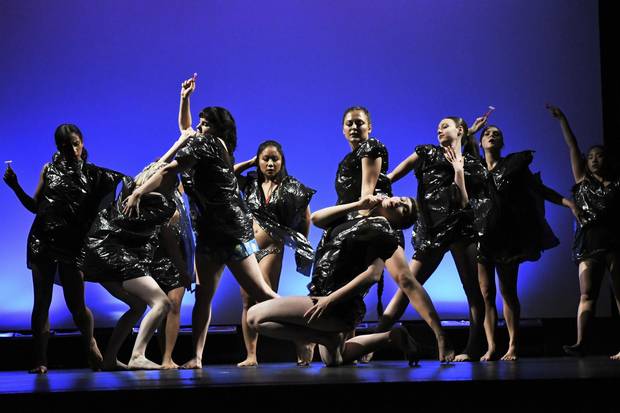Fringe festivals are as important for what they give as what they take away. The Next Stage Festival, which opened at Toronto's Factory Theatre on Wednesday, provides indie artists with the essentials: a venue, a few lights and some promotional support. Beyond that, production budgets are typically tiny and sets need to be stored in the wings, so the work can't rely on much but its barest bones. This minimalism is my favourite part – dance and theatre stripped to their basics.
I caught three one-hour shows over the Next Stage's first two days. They ran the gamut on quality – in true fringey spirit. I was most impressed with the funny and tender Good Morning, Viet Mom, a one-man documentary-style show written and performed by Franco Nguyen and directed by Byron Abalos. The play relays Nguyen's experience growing up in Toronto as a first-generation Canadian. His mother was among the hundreds of thousands of Vietnamese people who escaped the communist regime in the decade after the Vietnam War via boat; she met his father at a refugee camp in Malaysia and they were resettled together in Winnipeg.
Nguyen's real project is to understand his mother and make sense of both the remoteness and closeness he feels – the latter being mostly literal: At the age of 30, he still lives at home. A very funny video sequence shows his mom smiling in glamorous sunglasses, while threatening him in Vietnamese about moving out. What comes into focus is a complex portrait of a woman of extreme strength and some baffling dependencies, and Nguyen's admiration and frustration are delivered without anything sentimental or too structurally tidy. There were a few instances in which the writing felt expositional, and a few in which Nguyen's relationship to his comedic storytelling felt a bit unclear or played too hard for laughs. But, on balance, this was an honest, touching and irreverent investigation of family, heritage and love.
That ‘F’ Word was created by Melissa Hart and Samantha Schleese, who also perform in the show.
Lisa Koh
I also enjoyed the spirited That "F" Word, a large ensemble dance piece about feminism, created by Melissa Hart and Samantha Schleese, and performed by them along with five featured dancers and the teenage Rasasvada Dance Company. Energizing sequences of hip hop were juxtaposed with engaging group arrangements of contemporary choreography. With the cast being so young, the performances felt raw and unpolished, which helped lend the content urgency. I particularly liked a duet that seemed to interrogate stereotypical ideas about gender: A woman in a dress and a woman in trousers found a dynamic physical vocabulary in which to tussle for control. After a young woman is ridiculed for not wearing a bra, a line of dancers performed a powerful reclamation of their bodies in gritty, synchronized steps. The more explicit condemnations of misogyny – coming on stage in bathing suits, tracing disposable razors over their bodies – felt a little clichéd.
Moonlight after Midnight, a two-hander written by Martin Dockery and starring him and Vanessa Quesnelle, is structured like a set of Russian nesting dolls. A man and a woman meet in a hotel room; are they husband and wife enjoying a little role-playing or has the man hired the woman to play his wife? A scenario that doesn't rule out either possibility is reprised over and over again, so that each story contains the one that preceded it. Sound clever? In theory, I suppose it might be, and this show has been well-reviewed on the Fringe circuit, where it's made stops in Edinburgh and Australia. But I found the overdetermined concept made it difficult to connect to the material, beyond trying to piece together how anything happening on stage was plausible. This problem wasn't helped by uninteresting dialogue that sounded stilted, coupled by performances that felt strained. It seemed as though the scenarios were going to continue, tediously, with no resolution; in fact, we're given an ending, but one that felt absurdly far-fetched.
The Next Stage Festival runs through Jan. 14 (fringetoronto.com).



